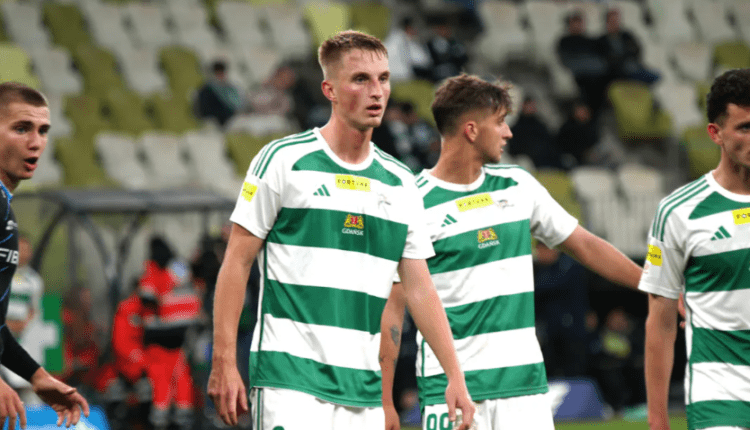I don’t regret coming here. If I had to make the decision again, I would do the same – says Lechia Gdańsk defender Elias Olsson. The Swede was one of the top defenders of Fortuna I league last season. He is also not discouraged by financial problems.
After only one year in the Fortuna I league, Lechia Gdańsk returned to the PKO Ekstraklasa, being by far the best team in the entire league.
The team led by Szymon Grabowski conceded 34 goals (an average of one goal per game). It was the third best defense in the league, and one of the leaders was the 21-year-old Swede Elias Olsson. He scored a goal in his debut, and played in every game from start to finish. He only got one yellow card, which is not so obvious for a defender.
Elias Olsson, Swedish defender of Lechia Gdańsk : Yes. I always wanted to be a footballer and I didn’t have any plan B. I never thought what I would do in life if it wasn’t for football. It was my dream since I was a child. I’m happy that I can do what I love.
Do you come from a wealthy family?
From normal. I mean, we never had much, but we never lacked anything either.
Did your parents encourage you to become a footballer?
Not really. They always told me to do what I thought was right. I was always the boss when I had to make a decision. My parents never told me to go here or there. I think from the time I was ten I was making my own decisions. I think I was raised well. That helped me.
Do you like watching football?
It’s different for me. I have different periods and sometimes I watch a lot of football and sometimes I don’t turn on the TV at all. I constantly observe and I’m interested in how my previous clubs are doing. Of course I watch the hit matches of the European Championship, but we are currently preparing for the season, after every training session I am very tired and there are days when I’ve had enough of football.
The second tier of the Polish league is not exactly the first choice for a young player from Sweden. Where did the idea to go to Lechia come from?
I had a difficult situation at my previous club, I didn’t play much. My manager presented me with an offer from Lechia and I just thought it was the perfect opportunity for me. I spoke to a few people and made a decision very quickly.
I suspect you did a little research before signing and heard about all the club’s problems.
I didn’t bother myself with it at all. I don’t think about money. When I came here, I had a simple plan: to advance to the Ekstraklasa. I wanted to play football regularly, that was the most important thing for me. And I’m glad I achieved both goals. I don’t regret coming here. If I had to make the decision again, I would do the same.
How much do the constant financial problems bother you? Are you able to fully focus on football?
It’s none of my business. I’m focused on playing football.
Your entry into Lechia was lightning fast.
I signed a contract, took part in 2-3 training sessions with the team and played from the first minute. I scored a goal in my debut and we won a very important match with Znicz. I started perfectly and then I grew from week to week.
Where did this sudden increase in your form come from? In your previous club you made various mistakes, but in Lechia there were practically none.
First of all, in Lechia I played in every match. I played a full season and that gave me a lot. I developed as a player. In my previous club I usually entered the pitch at the end, when I had to defend the result. That’s the biggest difference.
In Lechia you had a secure place in the squad because apart from you the only central defender was Andrei Chindris. Does it help when you don’t have to worry about playing or is it better to have someone to compete with?
I think we had a good defensive formation last season. It was me, Chindris, Koperski, Gueho. I defended on the pitch and that’s why I played. I had a very good season, I didn’t give the coach any arguments to drop me, but of course competition helps the whole team develop.
In what aspects have you made the greatest progress?
I have improved in everything, but I think the most is passing, moving around the pitch, reading the game. I analyze each match, I pay attention to what I could have done better. I can see for myself that I am making progress from week to week.
Exactly, you played the entire season in Fortuna I league. Where did you see the biggest differences compared to, for example, the Swedish league?
There is a lot of fighting in Poland. Definitely more duels, matches are often not pretty to look at. And anything can happen in them. In this league, anyone can beat anyone. I remember a match in Sosnowiec, when we lost 2:5.
Would you agree that things might be easier for you in the Ekstraklasa? There, your opponent won’t be defending against you with their entire team in their own half in every match.
In Ekstraklasa there is more emphasis on tactics, and there are definitely more quality players. This can be beneficial for us, because as Lechia we will not only defend. We want to attack, play football, and bring joy to our fans. We have a lot of quality in the team and I think we will manage.
There is a great deal of disappointment in Poland about our national team’s participation in the European Championship. On the other hand, Sweden did not make it to the tournament at all.
We have a new generation of players. We have a new coach, many young players and it takes time for everything to start working as it should. It’s a matter of a few years and I think we will see a much better Sweden. We look at this team through the prism of Zlatan Ibrahimovic, but that’s in the past. The biggest stars have already ended their careers. Now the new ones have to show that they deserve to play for this country. We have very good players, playing in the best European leagues. Now we need to create a solid national team from this.
And what about the level in the Swedish league? You mentioned that you follow your former teams. Is that progressing?
I think so. You can see that in the number of Swedish players who play in European cups. There are more and more of them every year. In recent years, many of them have gone from the Swedish league to Germany or England. Football in Sweden is developing.


